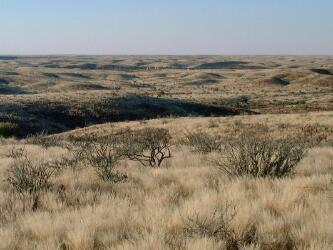OUT OF AFRICA AND IN INTO ONESELF
I’ve recently finished reading Alexander McCall Smith’s eleventh book in “The No. 1 Ladies Detective Agency” series and was stunned to read his description of the Africa veldt. As his central character steps out of her van to look into the emptiness around her, she has the following reaction:
“Mma Ramotswe shivered: to stand on the verge of something so great and so empty seemed to be in danger of being swallowed up; she often felt that way when she was in the wild places of her country. It would be so easy to become lost, to disappear, to find yourself alone in a wide slice of Africa, reduced to what you really were, a small and vulnerable creature among many other creatures.” (“The Double Comfort Safari Club”)

(image: the-wild-life.com)
The observation triggered a remembrance of my own, having spent over two years in the same part of the country where McCall Smith’s stories take place. Referring to my diaries I found I’d had recorded the same experiences. I offer that remembrance below. It should leave no doubt that the African experience is special.
…
The Ultimate Freedom
As a westerner, an American, the word freedom springs lightly to the lips; yet I confess that not until my sojourn to Africa did I discover its true meaning. I came to this understanding on hot afternoon when I made the innocent decision to carry my lunch outside, away from Leander and away from the one hundred girls and the handful of fellow teachers who were domiciled with me. I needed to be alone and so I walked until the building behind me was no more than a speck.Ahead lay an almost perfect 360 degrees of isolation. The planet, it seemed, belonged to me.
Finding a rock, I sat down and unwrapped the cheese sandwich I’d brought. Somehow it tasted better than any cheese sandwich I’d ever eaten. So did the coke that I drank to wash it down. The tranquility of the place seemed to heighten my senses. I was at peace.
Eventually, I discovered that I was not alone. A prickly sensation at the back of my neck forced me turn around and there I saw two giraffes, both of them staring down at me with a quizzical interest. I froze out of instinct. Giraffes were not dangerous, I supposed; but I’d never observed them except at a zoo with a fence between us or in the wild from the safety of a car. On that day, they were close enough to touch, though I resisted the impulse. Instead, I nibbled at the edge of my sandwich, behaving as though lunching with giraffes were an ordinary occurrence. My thoughts, however, were not so sanguine. If giraffes were near could the lions be far behind?
Bored with me, the animals drifted away and disappeared into the quivering heat. I watched them dissolve, and in that moment, it occurred to me that I might do the same. I could vanish into that endless space without a trace, leaving a mystery in the void. Perhaps I would walk for a hundred or a thousand of miles before encountering another human face. Would we greet each other in kinship, I wondered. Or would we be suspicious, even hostile? In that endless space, without civilization’s restraint, one person might choose to kill the other. Who would know? Who would care?
Staring into the veldt, I came to understand in the gut rather than in the brain, that shorn of laws and mores, humans no longer stood at the top of evolution’s chain. In a harsh land, where survival went to the fittest, a man was a puny creature, least suited to prevail against a predator with claws and fangs. Nor was speed on his side. We humans survive by cooperation. Our societies define us and by our laws we seek to transcend the laws of Nature. We think ourselves free when we hold Nature most at bay.

(BingImages)
But, on that ordinary day, sitting on the ground with my sack lunch, I came to a new realization. As my mind wandered farther and father into the veldt of my imagination, I could feel the edges of my being dissolve. I was no longer an individual of whom one asks the question, “Who are you?” I was like an undifferentiated cell, capable of infinite permutations. Freedom, as I experienced it on that hot afternoon, was not a concept but a state of being. To glimpse the nothing that is everything is the beauty and the terror of Africa.